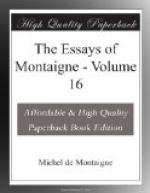if there be some who think it had vanished and melted
through their fingers had it not more upheld itself
among us as a mark, title, and instrument of division
and faction, than by itself. As in conference,
the gravity, robe, and fortune of him who speaks,
ofttimes gives reputation to vain arguments and idle
words, it is not to be presumed but that a man, so
attended and feared, has not in him more than ordinary
sufficiency; and that he to whom the king has given
so many offices and commissions and charges, he so
supercilious and proud, has not a great deal more
in him, than another who salutes him at so great a
distance, and who has no employment at all. Not
only the words, but the grimaces also of these people,
are considered and put into the account; every one
making it his business to give them some fine and
solid interpretation. If they stoop to the common
conference, and that you offer anything but approbation
and reverence, they then knock you down with the authority
of their experience: they have heard, they have
seen, they have done so and so: you are crushed
with examples. I should willingly tell them,
that the fruit of a surgeon’s experience, is
not the history of his practice and his remembering
that he has cured four people of the plague and three
of the gout, unless he knows how thence to extract
something whereon to form his judgment, and to make
us sensible that he has thence become more skillful
in his art. As in a concert of instruments,
we do not hear a lute, a harpsichord, or a flute alone,
but one entire harmony, the result of all together.
If travel and offices have improved them, ’tis
a product of their understanding to make it appear.
’Tis not enough to reckon experiences, they
must weigh, sort and distil them, to extract the reasons
and conclusions they carry along with them.
There were never so many historians: it is, indeed,
good and of use to read them, for they furnish us
everywhere with excellent and laudable instructions
from the magazine of their memory, which, doubtless,
is of great concern to the help of life; but ’tis
not that we seek for now: we examine whether
these relaters and collectors of things are commendable
themselves.
I hate all sorts of tyranny, both in word and deed. I am very ready to oppose myself against those vain circumstances that delude our judgments by the senses; and keeping my eye close upon those extraordinary greatnesses, I find that at best they are men, as others are:
“Rarus
enim ferme sensus communis in illa
Fortuna.”
["For in those high
fortunes, common sense is generally rare.”
—Juvenal,
viii. 73.]




